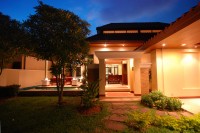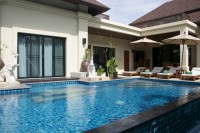 Acquisition of Thai Property by Non-Thai Nationals
Acquisition of Thai Property by Non-Thai Nationals
Thai laws prohibit foreigners from owning land in Thailand. However, the Thailand Condominium Act (2008) allows non-Thai nationals to acquire apartments in condominiums. If a foreign buyer does not reside in Thailand permanently, he or she will have to provide evidence that property is purchased for money brought from abroad. To this end, the buyer must submit a Foreign Exchange Transaction Form provided by a bank in Thailand.
 The demand for rental property in Thailand has been growing steadily for several years, which can be explained by several major factors. Above all, tourists who arrive every year realize that there is no benefit in paying almost the same price for a month stay in a five star hotel if they can reside in a luxury villa with a swimming pool and a garden in a completely intimate and quiet ambiance. Several bedrooms in a rented villa allows more than one family to share the villa and to split the cost of renting, respectively.
The demand for rental property in Thailand has been growing steadily for several years, which can be explained by several major factors. Above all, tourists who arrive every year realize that there is no benefit in paying almost the same price for a month stay in a five star hotel if they can reside in a luxury villa with a swimming pool and a garden in a completely intimate and quiet ambiance. Several bedrooms in a rented villa allows more than one family to share the villa and to split the cost of renting, respectively.
 If you acquire a property in Thailand, in addition to owning a home in this Paradise on earth, you will also earn income from your property. How can you choose property for investment that will maximize your income without taking care of the property while you are away? This question concerns all people who want to invest in Thai property.
If you acquire a property in Thailand, in addition to owning a home in this Paradise on earth, you will also earn income from your property. How can you choose property for investment that will maximize your income without taking care of the property while you are away? This question concerns all people who want to invest in Thai property.
 An apartment block consists of apartments. An apartment may be a large room, called a studio, or it may have several bedrooms. In Thailand, people use the American system of designating the number of rooms in an apartment. In other words, they specify only the number of bedrooms (the living room is not counted).
An apartment block consists of apartments. An apartment may be a large room, called a studio, or it may have several bedrooms. In Thailand, people use the American system of designating the number of rooms in an apartment. In other words, they specify only the number of bedrooms (the living room is not counted).
 During the acquisition and sale of property in Thailand, the following taxes and fees are paid:
During the acquisition and sale of property in Thailand, the following taxes and fees are paid:
- Transfer Fee: 2% of the appraised property value (calculated at the Land Office, which may differ from the property value specified in the contract).
- Stamp duty: 0.5% of the maximum property value (specified in the contractor appraised). It is paid if the property was owned by the last owner for over 5 years.
 Sky Property offers cooperation to legal entities and individuals for customer attraction.
Sky Property offers cooperation to legal entities and individuals for customer attraction.
- Do you work in the tourism business? Do your tourists travel to Thailand? You can increase your income right now by informing your clients on the services of our company.
- Are you are a real estate agency? Let your customers discover the real estate in Thailand in cooperation with Sky Property!









